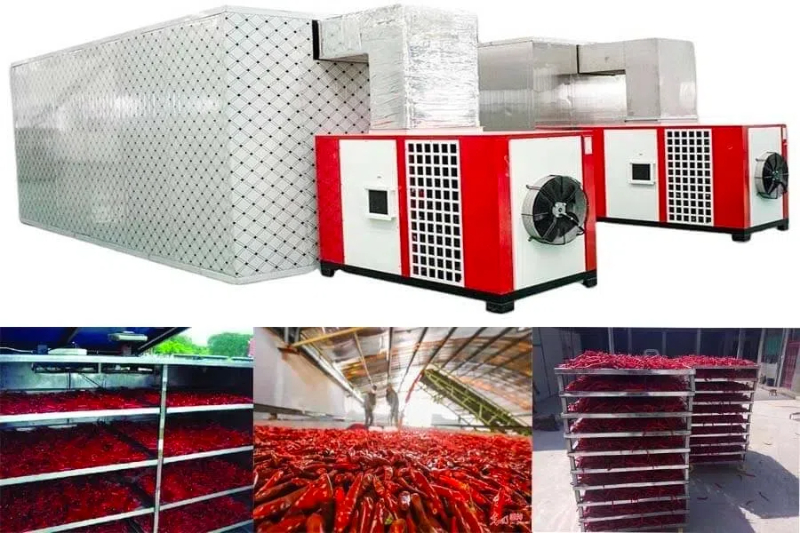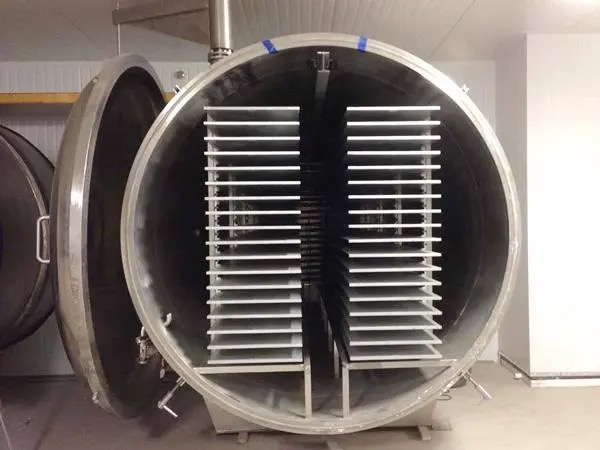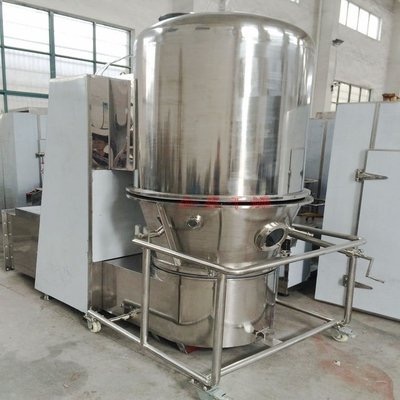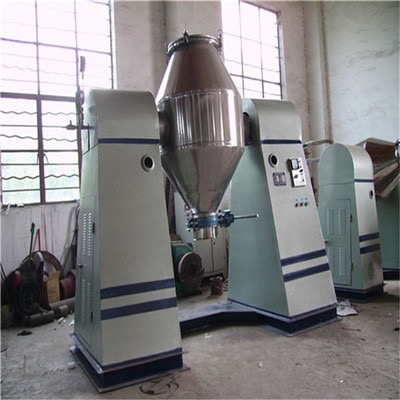
Content Menu
● Introduction to Food Drying Technology
● Understanding Food Drying Machines
>> Types of Food Drying Machines
● The Importance of Choosing the Right Food Drying Machine Supplier
● Top Food Drying Machine Suppliers in the Industry
>> 1. IKE Machinery
>> 2. Kinkai Tech
>> 3. Harter GmbH
>> 4. Dryera
● Key Features of Modern Food Drying Machines
● Applications of Food Drying Machines in Various Industries
>> 1. Fruit and Vegetable Processing
>> 2. Meat and Seafood Industry
>> 3. Herb and Spice Production
>> 4. Pet Food Manufacturing
>> 5. Nutraceutical and Functional Food Production
● Factors to Consider When Choosing a Food Drying Machine
● The Future of Food Drying Technology
● Conclusion
● Frequently Asked Questions
>> 1. What is the difference between commercial and industrial food drying machines?
>> 2. How do heat pump food dryers work?
>> 3. What are the advantages of using stainless steel food dryers?
>> 4. How can I determine the right capacity for my food drying machine?
>> 5. What maintenance is required for food drying machines?
Introduction to Food Drying Technology
In the ever-evolving world of food processing and preservation, food drying machine suppliers play a crucial role in providing innovative solutions for businesses of all sizes. From small-scale operations to large industrial facilities, the demand for efficient and reliable food drying equipment continues to grow. This comprehensive guide will explore the world of food drying machines, their applications, and the top suppliers in the industry.
Understanding Food Drying Machines
Food drying machines, also known as dehydrators, are essential tools in the food processing industry. These machines remove moisture from various food products, extending their shelf life while preserving nutritional value and flavor. The process of food drying has been used for centuries, but modern technology has revolutionized the efficiency and effectiveness of this preservation method.
Types of Food Drying Machines
Food drying machine suppliers offer a wide range of equipment to cater to different needs and production scales. Some common types include:
1. Industrial food dehydrators
2. Commercial fruit dryers
3. Vegetable drying equipment
4. Heat pump food dryers
5. Large capacity drying rooms
Each type of machine is designed to handle specific food products and production volumes, ensuring optimal results for various applications.

The Importance of Choosing the Right Food Drying Machine Supplier
Selecting the appropriate food drying machine supplier is crucial for the success of any food processing operation. The right supplier not only provides high-quality equipment but also offers valuable expertise and support throughout the entire process. Here are some key factors to consider when choosing a food drying machine supplier:
1. Experience and reputation in the industry
2. Range of products and customization options
3. Technical support and after-sales service
4. Energy efficiency and sustainability of the equipment
5. Compliance with food safety regulations and standards
By carefully evaluating these factors, businesses can ensure they partner with a reliable supplier that meets their specific needs and requirements.
Top Food Drying Machine Suppliers in the Industry
Several reputable food drying machine suppliers have established themselves as leaders in the industry. These companies offer a wide range of products and services to cater to various food processing needs. Some notable suppliers include:
1. IKE Machinery
IKE Machinery is a renowned manufacturer of food processing machines, specializing in commercial and industrial dehydrators. Their product line includes a variety of food drying machines suitable for fruits, vegetables, and meat products. IKE's large capacity high-temperature food drying rooms are particularly popular among large-scale food processors.
2. Kinkai Tech
Kinkai Tech is a leading manufacturer and supplier of food drying machines and commercial dehydrators. They offer a comprehensive range of equipment for drying fruits, vegetables, and meat products. Kinkai Tech's commitment to innovation and quality has made them a preferred choice for many food processing businesses.
3. Harter GmbH
Harter GmbH is a German company specializing in drying technology for various industries, including food processing. Their expertise in energy-efficient drying solutions has earned them a reputation for producing high-quality, sustainable equipment.
4. Dryera
Dryera is a Chinese manufacturer known for its heat pump food drying machines. Their products are designed to offer energy-efficient drying solutions for a wide range of food products. Dryera's commitment to innovation and customization has made them a popular choice among food processors looking for tailored drying solutions.
Key Features of Modern Food Drying Machines
As technology advances, food drying machine suppliers continue to innovate and improve their products. Some key features of modern food drying machines include:
1. Precise temperature and humidity control
2. Multi-layer belt systems for continuous drying
3. Stainless steel construction for durability and hygiene
4. Energy-efficient heat pump technology
5. Advanced control systems for automated operation
6. Customizable drying programs for different food products
These features contribute to improved efficiency, product quality, and overall performance of food drying operations.

Applications of Food Drying Machines in Various Industries
Food drying machines find applications in numerous industries, each with its unique requirements and challenges. Some of the primary industries that rely on food drying technology include:
1. Fruit and Vegetable Processing
The fruit and vegetable processing industry extensively uses food drying machines to produce dried fruits, vegetable chips, and powders. These products have a longer shelf life and are popular among consumers as healthy snacks and ingredients.
2. Meat and Seafood Industry
Food drying machines play a crucial role in the production of jerky, dried fish, and other preserved meat products. The drying process helps extend the shelf life of these products while maintaining their nutritional value and flavor.
3. Herb and Spice Production
Drying is an essential step in the production of herbs and spices. Food drying machines help preserve the aroma and flavor of these products, ensuring high-quality ingredients for the food industry.
4. Pet Food Manufacturing
The pet food industry utilizes food drying machines to produce dry kibble and treats. These machines help create shelf-stable products that maintain their nutritional value and appeal to pets.
5. Nutraceutical and Functional Food Production
Food drying machines are essential in the production of nutraceuticals and functional foods, such as dried superfoods, protein powders, and dietary supplements.
Factors to Consider When Choosing a Food Drying Machine
When selecting a food drying machine, several factors should be taken into account to ensure the best fit for your specific needs:
1. Production capacity and scale
2. Types of food products to be dried
3. Energy efficiency and operating costs
4. Space requirements and facility layout
5. Ease of cleaning and maintenance
6. Integration with existing production lines
7. Budget and return on investment
By carefully evaluating these factors, businesses can make informed decisions when choosing food drying equipment from reputable suppliers.
The Future of Food Drying Technology
As the demand for dried food products continues to grow, food drying machine suppliers are investing in research and development to create more efficient and sustainable solutions. Some emerging trends in food drying technology include:
1. Integration of artificial intelligence and machine learning for optimized drying processes
2. Development of hybrid drying systems combining multiple technologies
3. Increased focus on energy recovery and sustainability
4. Adoption of Internet of Things (IoT) for remote monitoring and control
5. Advancements in non-thermal drying methods, such as freeze-drying and microwave drying
These innovations promise to revolutionize the food drying industry, offering even more efficient and versatile solutions for food processors.
Conclusion
Food drying machine suppliers play a vital role in the food processing industry, providing essential equipment for preserving and extending the shelf life of various food products. By understanding the different types of food drying machines, their applications, and the key factors to consider when choosing a supplier, businesses can make informed decisions to optimize their food drying operations.
As technology continues to advance, the future of food drying looks promising, with more efficient, sustainable, and versatile solutions on the horizon. By staying informed about the latest developments and working closely with reputable food drying machine suppliers, businesses can stay ahead of the curve and meet the growing demand for high-quality dried food products.

Frequently Asked Questions
1. What is the difference between commercial and industrial food drying machines?
Commercial food drying machines are typically designed for smaller-scale operations, such as restaurants, small food processors, or specialty food producers. They have lower capacity and are often more compact. Industrial food drying machines, on the other hand, are built for large-scale production facilities. They have higher capacity, more advanced features, and are designed for continuous operation in demanding environments.
2. How do heat pump food dryers work?
Heat pump food dryers use a closed-loop system to efficiently remove moisture from food products. The system works by circulating air through a series of components, including an evaporator, compressor, condenser, and expansion valve. This process allows for precise control of temperature and humidity, resulting in energy-efficient drying without the need for external heat sources.
3. What are the advantages of using stainless steel food dryers?
Stainless steel food dryers offer several advantages, including:
- Durability and longevity
- Resistance to corrosion and rust
- Easy to clean and maintain
- Hygienic surface that prevents bacterial growth
- Compliance with food safety regulations
- Ability to withstand high temperatures and harsh cleaning chemicals
4. How can I determine the right capacity for my food drying machine?
To determine the right capacity for your food drying machine, consider the following factors:
- Daily production volume
- Types of food products to be dried
- Moisture content of the raw materials
- Desired final moisture content
- Available space in your facility
- Production schedule (batch vs. continuous processing)
It's best to consult with food drying machine suppliers to assess your specific needs and recommend the most suitable equipment for your operation.
5. What maintenance is required for food drying machines?
Regular maintenance of food drying machines is essential to ensure optimal performance and longevity. Some key maintenance tasks include:
- Cleaning and sanitizing the drying chamber and trays
- Inspecting and replacing air filters
- Checking and lubricating moving parts
- Calibrating temperature and humidity sensors
- Inspecting and cleaning heat exchangers (for heat pump systems)
- Verifying proper airflow and circulation
- Conducting regular performance tests
Always follow the manufacturer's guidelines for maintenance and consider establishing a preventive maintenance schedule to minimize downtime and extend the life of your equipment.












